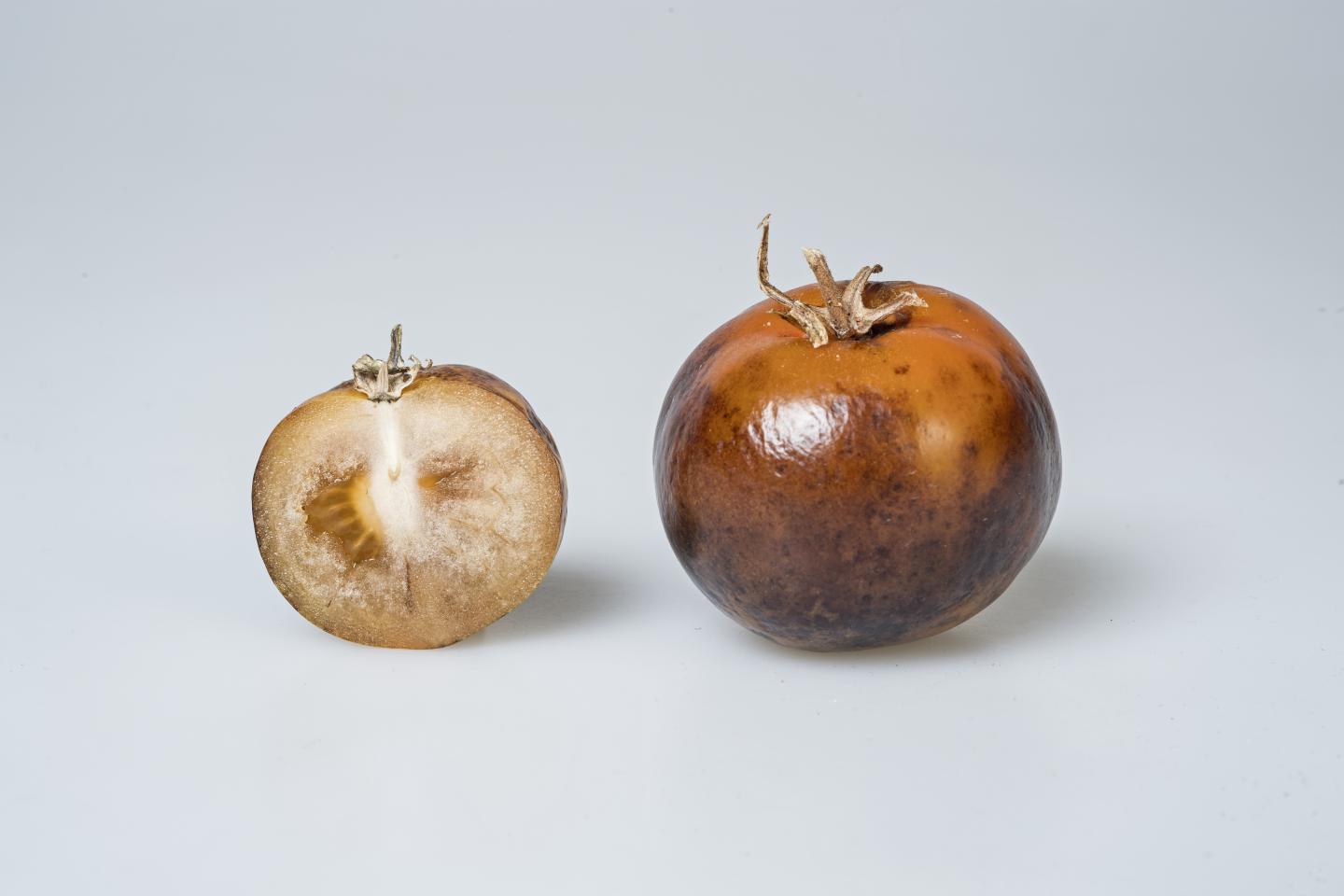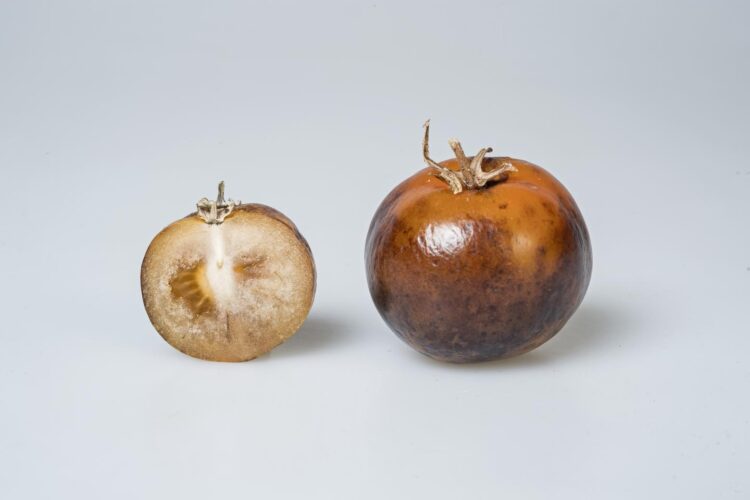
Credit: Phil Robinson
Scientists have produced a tomato enriched in the Parkinson’s disease drug L-DOPA in what could become a new, affordable source of one of the world’s essential medicines.
The development of the genetically modified (GM) tomato has implications for developing nations where access to pharmaceutical drugs is restricted.
This novel use of tomato plants as a natural source of L-DOPA also offers benefits for people who suffer adverse effects – including nausea and behavioral complications – of chemically synthesised L-DOPA .
Tomato – was chosen as a widely cultivated crop that can be used for scaled up production and potentially offering a standardised and controlled natural source of L-DOPA .
The John Innes Centre led team modified the tomato fruit by introducing a gene responsible for the synthesis of L-DOPA in beetroot where it functions in the production of the pigments betalains.
L-DOPA is produced from tyrosine, an amino acid found in many foods. The research team inserted a gene encoding a tyrosinase, an enzyme that uses tyrosine to build molecules such as L-DOPA . This elevated the level of L-DOPA specifically in the fruit part of the plant and led to higher yields than those associated with L-DOPA production in the whole plant.
The levels achieved in the tomato fruit – 150mg of L-DOPA per kg of tomatoes – were comparable those observed in other L-DOPA accumulating plants – without some of the known drawbacks that have hampered plant metabolic production of the drug previously.
The aim now is to create a production pipeline where L-DOPA is extracted from the tomatoes and purified into the pharmaceutical product.
Professor Cathie Martin (FRS), corresponding author of the study explains: “The idea is that you can grow tomatoes with relatively little infrastructure. As GMOs (genetically modified organisms) you could grow them in screen houses, controlled environments with very narrow meshes, so you would not have pollen escape through insects.
“Then you could scale up at relatively low cost. A local industry could prepare L-DOPA from tomatoes because it’s soluble and you can do extractions. Then you could make a purified product relatively low tech which could be dispensed locally.”
Parkinson’s disease is a growing problem in developing countries where many people cannot afford the daily $2 price of synthetic L-DOPA .
L-DOPA is an amino acid precursor of the neuro-chemical dopamine and is used to compensate for the depleted supply of dopamine in Parkinson’s disease patients.
Also known as Levodopa, L-DOPA has been the gold standard therapy for Parkinson’s disease since its establishment as a drug in 1967. It is one of the essential medicines declared by the World Health Organisation (WHO) and its market value is in the hundreds of billions of dollars.
The most common form of the drug is produced by chemical synthesis, but natural sources are also available. Only a few plants have been reported to contain measurable quantities of the molecule, mainly in seeds.
The most studied is the velvet bean, Mucuna pruriens, which contains up to 10% L-DOPA in its seeds. But this is problematic because the plant is covered in urticating hairs that contain mucunian that can cause irritation and allergic reactions in field workers who harvest the crop. The beans themselves cause elevated levels of tryptamines that can cause hallucinations in Parkinsons disease patients.
“We have demonstrated that the use of the tyrosinase-expressing tomatoes as a source of L-DOPA is possible. It’s a further demonstration of tomato as a strong option for synthetic biology. Additionally, there were surprising beneficial effects including improvement in shelf-life and raised levels of amino-acids that we can investigate,” says first author Dr Dario Breitel.
###
The study: Metabolic engineering of tomato fruit enriched in L-DOPA appears in the journal, Metabolic Engineering.
Pictures/Media and captions:
https:/
Notes for Editors
Contacts
Press Contact:
Adrian Galvin –
[email protected]
Tel: 01603 450238/07876 791 454
About the John Innes Centre
The John Innes Centre is an independent, international centre of excellence in plant science and microbiology.
Our mission is to generate knowledge of plants and microbes through innovative research, to train scientists for the future, to apply our knowledge of nature’s diversity to benefit agriculture, the environment, human health, and wellbeing, and engage with policy makers and the public.
To achieve these goals we establish pioneering long-term research objectives in plant and microbial science, with a focus on genetics. These objectives include promoting the translation of research through partnerships to develop improved crops and to make new products from microbes and plants for human health and other applications. We also create new approaches, technologies and resources that enable research advances and help industry to make new products. The knowledge, resources and trained researchers we generate help global societies address important challenges including providing sufficient and affordable food, making new products for human health and industrial applications, and developing sustainable bio-based manufacturing.
This provides a fertile environment for training the next generation of plant and microbial scientists, many of whom go on to careers in industry and academia, around the world.
The John Innes Centre is strategically funded by the Biotechnology and Biological Sciences Research Council (BBSRC), and is supported by the John Innes Foundation through provision of research accommodation, capital funding and long-term support of the Rotation PhD programme.
For more information about the John Innes Centre visit our website
http://www.
About BBSRC
The Biotechnology and Biological Sciences Research Council (BBSRC) is part of UK Research and Innovation, a non-departmental public body funded by a grant-in-aid from the UK government.
BBSRC invests in world-class bioscience research and training on behalf of the UK public. Our aim is to further scientific knowledge, to promote economic growth, wealth and job creation and to improve quality of life in the UK and beyond.
Funded by government, BBSRC invested £498 million in world-class bioscience in 2017-18. We support research and training in universities and strategically funded institutes. BBSRC research and the people we fund are helping society to meet major challenges, including food security, green energy and healthier, longer lives. Our investments underpin important UK economic sectors, such as farming, food, industrial biotechnology and pharmaceuticals.
More information about?UK Research and Innovation.
More information about?BBSRC, our science and our impact.
More information about?BBSRC strategically funded institutes.
Media Contact
Adrian Galvin
[email protected]





